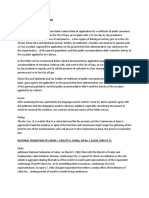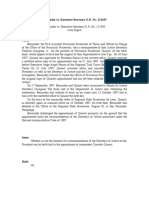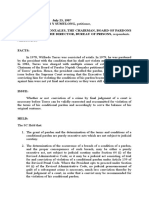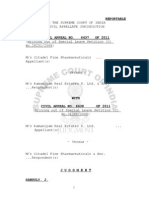Torres vs. Gonzales
Torres vs. Gonzales
Uploaded by
MingCopyright:
Available Formats
Torres vs. Gonzales
Torres vs. Gonzales
Uploaded by
MingOriginal Description:
Copyright
Available Formats
Share this document
Did you find this document useful?
Is this content inappropriate?
Copyright:
Available Formats
Torres vs. Gonzales
Torres vs. Gonzales
Uploaded by
MingCopyright:
Available Formats
Torres vs.
Gonzales
152 SCRA 272 – Political Law – Constitutional Law – Pardon – Not Subject to Judicial
Review/Scrutiny
In 1978, Wilfredo Torres was convicted of estafa. In 1979, he was pardoned by the
president with the condition that he shall not violate any penal laws again. In 1982, Torres
was charged with multiple crimes of estafa. In 1986, then Chairman of the Board of Paroles
Neptali Gonzales petitioned for the cancellation of Torres’ pardon. Hence, the president
cancelled the pardon. Torres appealed the issue before the Supreme Court averring that the
Executive Department erred in convicting him for violating the conditions of his pardon
because the estafa charges against him were not yet final and executory as they were still
on appeal.
ISSUE: Whether or not conviction of a crime by final judgment of a court is necessary
before Torres can be validly rearrested and recommitted for violation of the terms of his
conditional pardon and accordingly to serve the balance of his original sentence.
HELD: The SC affirmed the following:
1. The grant of pardon and the determination of the terms and conditions of a conditional
pardon are purely executive acts which are not subject to judicial scrutiny.
2. The determination of the occurrence of a breach of a condition of a pardon, and the
proper consequences of such breach, may be either a purely executive act, not subject to
judicial scrutiny under Section 64 (i) of the Revised Administrative Code; or it may be a
judicial act consisting of trial for and conviction of violation of a conditional pardon under
Article 159 of the Revised Penal Code. Where the President opts to proceed under Section
64 (i) of the Revised Administrative Code, no judicial pronouncement of guilt of a
subsequent crime is necessary, much less conviction therefor by final judgment of a court,
in order that a convict may be recommended for the violation of his conditional pardon.
3. Because due process is not semper et ubique judicial process, and because the
conditionally pardoned convict had already been accorded judicial due process in his trial
and conviction for the offense for which he was conditionally pardoned, Section 64 (i) of the
Revised Administrative Code is not afflicted with a constitutional vice.
In proceeding against a convict who has been conditionally pardoned and who is alleged to
have breached the conditions of his pardon, the Executive Department has two options: (i)
to proceed against him under Section 64 (i) of the Revised Administrative Code; or (ii) to
proceed against him under Article 159 of the RPC which imposes the penalty of prision
correccional, minimum period, upon a convict who “having been granted conditional pardon
by the Chief Executive, shall violate any of the conditions of such pardon.” Here, the
President has chosen to proceed against the petitioner under Section 64 (i) of the Revised
Administrative Code. That choice is an exercise of the President’s executive prerogative
and is not subject to judicial scrutiny.
You might also like
- QUEZON CITY LIQUOR ORDINANCE - Ordinance No NC-085, S-89Document9 pagesQUEZON CITY LIQUOR ORDINANCE - Ordinance No NC-085, S-89MingNo ratings yet
- Greensboro's Untold Story: The Gay Scare of '57Document6 pagesGreensboro's Untold Story: The Gay Scare of '57Terrance HeathNo ratings yet
- Legal Research CasesDocument20 pagesLegal Research CasesReth GuevarraNo ratings yet
- Blaquera, Et Al. v. Alcala, 295 SCRA 366 (1998) PDFDocument2 pagesBlaquera, Et Al. v. Alcala, 295 SCRA 366 (1998) PDFArvhie Santos100% (1)
- Bondoc Vs PinedaDocument2 pagesBondoc Vs PinedaFeBrluadoNo ratings yet
- Edu vs. Ericta Case DigestDocument3 pagesEdu vs. Ericta Case DigestEugene DayanNo ratings yet
- Araullo Vs AquinoDocument3 pagesAraullo Vs AquinoMitch RoldanNo ratings yet
- Bermudez vs. Executive Secretary G.R. No. 131429Document1 pageBermudez vs. Executive Secretary G.R. No. 131429G-one PaisonesNo ratings yet
- 15 in Re Letter of Associate Justice Puno 210 SCRA 589 598 (1992)Document17 pages15 in Re Letter of Associate Justice Puno 210 SCRA 589 598 (1992)Gfor FirefoxonlyNo ratings yet
- Standard V Senate DigestDocument2 pagesStandard V Senate DigestPamela PrietoNo ratings yet
- Republic vs. Castelvi DIGESTDocument3 pagesRepublic vs. Castelvi DIGESTblessaraynesNo ratings yet
- Ecraela v. PangalanganDocument4 pagesEcraela v. PangalanganJohn Mark GNo ratings yet
- 20.1 People vs. Gacott DigestDocument1 page20.1 People vs. Gacott DigestEstel TabumfamaNo ratings yet
- NAVA v. GATMAITAN G.R. No. L-4855 - 11 October 1951Document1 pageNAVA v. GATMAITAN G.R. No. L-4855 - 11 October 1951Reynald LacabaNo ratings yet
- Silva vs. Cabrera, GR No. L-3629Document5 pagesSilva vs. Cabrera, GR No. L-3629Kirs CastleNo ratings yet
- PACETE V COMM ON APPOINTEMENTSDocument2 pagesPACETE V COMM ON APPOINTEMENTSLloyd David P. VicedoNo ratings yet
- Power of AppointmentDocument28 pagesPower of AppointmentRyanMacadangdangNo ratings yet
- Bello Vs Court of AppealsDocument1 pageBello Vs Court of AppealsRevz LamosteNo ratings yet
- Bermudez V Torres (Fullcase and Case Digest)Document6 pagesBermudez V Torres (Fullcase and Case Digest)Adrian Olaguer AguasNo ratings yet
- Bondoc vs. PinedaDocument2 pagesBondoc vs. PinedatheresaNo ratings yet
- Case Digest - Guevara vs. Inocentes, G. R. No. L-25577, 16 SCRA 379, March 15, 1966Document1 pageCase Digest - Guevara vs. Inocentes, G. R. No. L-25577, 16 SCRA 379, March 15, 1966MichaelaNo ratings yet
- Bermudez v. Executive Secretary, 213 SCRA 733 (1999) PDFDocument2 pagesBermudez v. Executive Secretary, 213 SCRA 733 (1999) PDFArvhie SantosNo ratings yet
- Vda de Espiritu v. COFI CaviteDocument2 pagesVda de Espiritu v. COFI CavitedelayinggratificationNo ratings yet
- Danilo E. Paras, Commission On Elections,: G.R. No. 123169 November 4, 1996Document15 pagesDanilo E. Paras, Commission On Elections,: G.R. No. 123169 November 4, 1996Aleph JirehNo ratings yet
- One Hundred Twenty Members of The House of RepresentativesDocument6 pagesOne Hundred Twenty Members of The House of RepresentativesLee YuNo ratings yet
- Felobello V. Palatino 72 PHIL. 441 G.R. No. L-48100 FactsDocument4 pagesFelobello V. Palatino 72 PHIL. 441 G.R. No. L-48100 FactsJay MarieNo ratings yet
- G.R. No. L-34676 April 30, 1974benjamin T. LigotDocument4 pagesG.R. No. L-34676 April 30, 1974benjamin T. LigotRaymondNo ratings yet
- 29-GD Salaysay V Castro, 98 PHI 364Document2 pages29-GD Salaysay V Castro, 98 PHI 364kenedy saetNo ratings yet
- Constitutional Law I Short ReviewDocument4 pagesConstitutional Law I Short ReviewPablo Lorenzo BenedictoNo ratings yet
- GR No. 202242, Chavez v. JBC, July 17, 2012Document25 pagesGR No. 202242, Chavez v. JBC, July 17, 2012VERA FilesNo ratings yet
- Comendador Et Al vs. de Villa Et AlDocument9 pagesComendador Et Al vs. de Villa Et AlD MonioNo ratings yet
- Pundaodaya V COMELECDocument2 pagesPundaodaya V COMELECAnne Renee SuarezNo ratings yet
- People Vs LacsonDocument2 pagesPeople Vs LacsonNick CunananNo ratings yet
- First Lepanto v. CA (Sec. 30)Document2 pagesFirst Lepanto v. CA (Sec. 30)Carlota Nicolas VillaromanNo ratings yet
- Erectors Inc. v. NLRC 256 SCRA 629 (1996)Document4 pagesErectors Inc. v. NLRC 256 SCRA 629 (1996)Rosel RamsNo ratings yet
- 9 Felipe V LeuterioDocument2 pages9 Felipe V LeuterioKate QuincoNo ratings yet
- H33-Barrioquinto v. FernandezDocument2 pagesH33-Barrioquinto v. FernandezJohn Lester TanNo ratings yet
- Judicial Department (Digested Cases) Section 5 Drilon V. Lim FactsDocument37 pagesJudicial Department (Digested Cases) Section 5 Drilon V. Lim FactsJoseph John Santos RonquilloNo ratings yet
- G.R. No. 113105Document2 pagesG.R. No. 113105Aerith Alejandre100% (1)
- CONSTI Magalona vs. ErmitaDocument2 pagesCONSTI Magalona vs. ErmitaPafra BariuanNo ratings yet
- Cristobal vs. Labrador, 71 Phil. 34 (1941)Document2 pagesCristobal vs. Labrador, 71 Phil. 34 (1941)Syd Geemson ParrenasNo ratings yet
- IBP vs. Zamora G.R. No.141284, August 15, 2000Document3 pagesIBP vs. Zamora G.R. No.141284, August 15, 2000meme bolongonNo ratings yet
- Tanada vs. Tuvera (136 SCRA 27) FULLDocument6 pagesTanada vs. Tuvera (136 SCRA 27) FULLMonalizts D.No ratings yet
- Angara V Electoral ComDocument2 pagesAngara V Electoral ComClauds GadzzNo ratings yet
- Villaluz Vs Zaldivar, 15 SCRA 710 (1965)Document1 pageVillaluz Vs Zaldivar, 15 SCRA 710 (1965)geni_pearlcNo ratings yet
- No. 4 Catiis V CADocument2 pagesNo. 4 Catiis V CAJamilah DagandanNo ratings yet
- The Executive DepartmentDocument3 pagesThe Executive DepartmentVivian NiñonNo ratings yet
- 27 Scra 533 Municipality of Malabang vs. BenitoDocument10 pages27 Scra 533 Municipality of Malabang vs. BenitoRowell SerranoNo ratings yet
- People vs. MerisDocument8 pagesPeople vs. Merisrodel_odzNo ratings yet
- 41.punzalan v. Mendoza 140 SCRA 153Document2 pages41.punzalan v. Mendoza 140 SCRA 153Mary Ann Dawilan LawaganNo ratings yet
- 11 Buenaseda Vs Flavier GR 106719Document3 pages11 Buenaseda Vs Flavier GR 106719KJPL_1987No ratings yet
- Finals NotesDocument6 pagesFinals NotesFerbNo ratings yet
- Caudal v. CA GR 83414, July 31, 1989Document6 pagesCaudal v. CA GR 83414, July 31, 1989Michael SherwinNo ratings yet
- Vera V People MolaveDocument2 pagesVera V People MolaveAbbyElbambo100% (1)
- CONSTI1 - Veterans Federation Party v. COMELEC, GR No.136781 (2000) - AMORILLODocument7 pagesCONSTI1 - Veterans Federation Party v. COMELEC, GR No.136781 (2000) - AMORILLODanica AmorilloNo ratings yet
- ABAKADA Guro Party List Officers Samson S Alcantara Et Al Vs The Honorable Executive Secretary Eduardo Ermita 469 SCRA 1Document5 pagesABAKADA Guro Party List Officers Samson S Alcantara Et Al Vs The Honorable Executive Secretary Eduardo Ermita 469 SCRA 1Khian JamerNo ratings yet
- Arceta Vs MangrobangDocument43 pagesArceta Vs MangrobangnchlrysNo ratings yet
- Case Digest STATCONDocument6 pagesCase Digest STATCONLegal Division DPWH Region 6No ratings yet
- TORRES V GonzalesDocument2 pagesTORRES V GonzalesEnzo Regondola100% (1)
- Torres vs. GonzalesDocument1 pageTorres vs. GonzalesNessalyn Mae Rosales ValenciaNo ratings yet
- Torres Vs GonzalesDocument2 pagesTorres Vs GonzalesAyban Nabatar100% (1)
- 18Document6 pages18MingNo ratings yet
- 1997 RULES OF CIVIL PROCEDURE - Rule 43Document1 page1997 RULES OF CIVIL PROCEDURE - Rule 43MingNo ratings yet
- Davao City Ordinance No. 057, Series of 1999Document3 pagesDavao City Ordinance No. 057, Series of 1999MingNo ratings yet
- 05 Inchong vs. Hernandez - Digest-1Document1 page05 Inchong vs. Hernandez - Digest-1MingNo ratings yet
- Spord 842-91Document2 pagesSpord 842-91MingNo ratings yet
- 5254 2017Document11 pages5254 2017MingNo ratings yet
- Statutory Construction 2Document33 pagesStatutory Construction 2MingNo ratings yet
- 4185-2013 - An Ordinance Temporarily Closing from All Types of Vehicle the Road at BarangayHoly Redeemer, this City, Particularly the Road in Front of the Holy Redeemer Parish Church for its Concreting to Start on ADocument3 pages4185-2013 - An Ordinance Temporarily Closing from All Types of Vehicle the Road at BarangayHoly Redeemer, this City, Particularly the Road in Front of the Holy Redeemer Parish Church for its Concreting to Start on AMingNo ratings yet
- 3824-2011 - An Ordinance Temporarily Closing from All Types of Vehicle a Portion of Montilla Street, Particularly from Junction of Montilla Boulevard Up to Junction of Langihan Road, on December 20, 2011, from 5_00Document2 pages3824-2011 - An Ordinance Temporarily Closing from All Types of Vehicle a Portion of Montilla Street, Particularly from Junction of Montilla Boulevard Up to Junction of Langihan Road, on December 20, 2011, from 5_00MingNo ratings yet
- DOH JulyDocument2 pagesDOH JulyMingNo ratings yet
- DOH JanuaryDocument2 pagesDOH JanuaryMingNo ratings yet
- DOH MarchDocument4 pagesDOH MarchMingNo ratings yet
- DOH JuneDocument1 pageDOH JuneMingNo ratings yet
- DOH FebruaryDocument3 pagesDOH FebruaryMingNo ratings yet
- DOE (January) : Organizing Inter-Agency Energy Efficiency and Conservation CommitteeDocument1 pageDOE (January) : Organizing Inter-Agency Energy Efficiency and Conservation CommitteeMingNo ratings yet
- DOE FebruaryDocument1 pageDOE FebruaryMingNo ratings yet
- DOH AprilDocument4 pagesDOH AprilMingNo ratings yet
- DILG JulyDocument1 pageDILG JulyMingNo ratings yet
- DILG MayDocument2 pagesDILG MayMingNo ratings yet
- DOE AprilDocument1 pageDOE AprilMingNo ratings yet
- DILG MarchDocument2 pagesDILG MarchMingNo ratings yet
- DepEd MarchDocument2 pagesDepEd MarchMingNo ratings yet
- DepEd AprilDocument1 pageDepEd AprilMingNo ratings yet
- DepEd JanuaryDocument1 pageDepEd JanuaryMingNo ratings yet
- DBM MarchDocument1 pageDBM MarchMingNo ratings yet
- UnsealDocument3 pagesUnsealRuss LatinoNo ratings yet
- 1978 S C M R 299Document4 pages1978 S C M R 299advabdullahahmadNo ratings yet
- CASE DIGEST Manchester vs. CADocument1 pageCASE DIGEST Manchester vs. CAMaria Anna M LegaspiNo ratings yet
- Citadel Fine Pharmaceuticals v. Ramaniyam Real Estates (P) LTD (2011) 9 SCC 147Document47 pagesCitadel Fine Pharmaceuticals v. Ramaniyam Real Estates (P) LTD (2011) 9 SCC 147Ashish Davessar100% (1)
- 43-Gsis v. CSC G.R. No. 87146 December 11, 1991Document5 pages43-Gsis v. CSC G.R. No. 87146 December 11, 1991Jopan SJNo ratings yet
- Chalifoux v. Chalifoux, 1st Cir. (2017)Document15 pagesChalifoux v. Chalifoux, 1st Cir. (2017)Scribd Government DocsNo ratings yet
- Corre Vs Tan CorreDocument2 pagesCorre Vs Tan CorreLean Manuel ParagasNo ratings yet
- An Overview of Bail in IndiaDocument22 pagesAn Overview of Bail in IndiaMriganka MajumderNo ratings yet
- Wed., July 20, 2011Document12 pagesWed., July 20, 2011The Delphos HeraldNo ratings yet
- Dye Construction Company v. Occupational Safety and Health Review Commission, 698 F.2d 423, 10th Cir. (1983)Document6 pagesDye Construction Company v. Occupational Safety and Health Review Commission, 698 F.2d 423, 10th Cir. (1983)Scribd Government DocsNo ratings yet
- Nicolas Vs MatiasDocument5 pagesNicolas Vs MatiasManelle Paula GutierrezNo ratings yet
- VOL. 419, JANUARY 15, 2004 487: Philippine Banking Corporation vs. Court of AppealsDocument35 pagesVOL. 419, JANUARY 15, 2004 487: Philippine Banking Corporation vs. Court of AppealsAmerigo VespucciNo ratings yet
- Apc Operating Partnership v. Dale G. MacKey and Evelyn C. MacKey and Darrell E. MacKey and Lovell H. MacKey, 841 F.2d 1031, 10th Cir. (1988)Document9 pagesApc Operating Partnership v. Dale G. MacKey and Evelyn C. MacKey and Darrell E. MacKey and Lovell H. MacKey, 841 F.2d 1031, 10th Cir. (1988)Scribd Government DocsNo ratings yet
- Pakistan Ordinance of Zakat and UshrDocument43 pagesPakistan Ordinance of Zakat and UshrSyed Asghar AliNo ratings yet
- Sanjay Chandra Vs Cbi On 23 November, 2011Document21 pagesSanjay Chandra Vs Cbi On 23 November, 2011SaiBharathNo ratings yet
- Labor Law Full TextDocument293 pagesLabor Law Full TextCharles DBNo ratings yet
- Viorel Topa, Victor Topa and Others v. The Republic of Moldova and 1 Other ApplicationDocument38 pagesViorel Topa, Victor Topa and Others v. The Republic of Moldova and 1 Other ApplicationZdGNo ratings yet
- OrdersDocument39 pagesOrdersking gwapo aoverNo ratings yet
- AntonymsDocument1 pageAntonymsČasovi Engleskog JezikaNo ratings yet
- Texas Supreme Court 14-0192 Petition Andrea CrowsonDocument64 pagesTexas Supreme Court 14-0192 Petition Andrea Crowsonxyzdocs100% (1)
- APRI V Mun of Padre GarciaDocument3 pagesAPRI V Mun of Padre GarciaCid Benedict PabalanNo ratings yet
- Continuance RequestDocument4 pagesContinuance Requestlindsay_wise6324No ratings yet
- United States v. Paul E. Turner, JR., 78 F.3d 580, 4th Cir. (1996)Document2 pagesUnited States v. Paul E. Turner, JR., 78 F.3d 580, 4th Cir. (1996)Scribd Government DocsNo ratings yet
- Lesson 20 - The Purposes of PunishmentDocument14 pagesLesson 20 - The Purposes of Punishmentapi-249423644No ratings yet
- OCA v. JudgeDocument2 pagesOCA v. JudgeLDNo ratings yet
- Midwest Industrial Funding, Division of Rivera Lend Lease, Inc. v. First National Bank of Lockport F/k/a Heritage First National Bank of Lockport, 973 F.2d 534, 1st Cir. (1992)Document7 pagesMidwest Industrial Funding, Division of Rivera Lend Lease, Inc. v. First National Bank of Lockport F/k/a Heritage First National Bank of Lockport, 973 F.2d 534, 1st Cir. (1992)Scribd Government DocsNo ratings yet
- Canuto v. MarianoDocument1 pageCanuto v. MarianoRyan WilliamsNo ratings yet
- PLD 2019 SC 183Document5 pagesPLD 2019 SC 183Usman Khan YousafzaiNo ratings yet
- Manacop Vs CA DigestDocument3 pagesManacop Vs CA Digestproject_ziNo ratings yet



















































































































